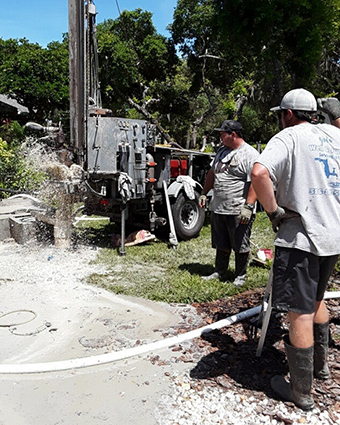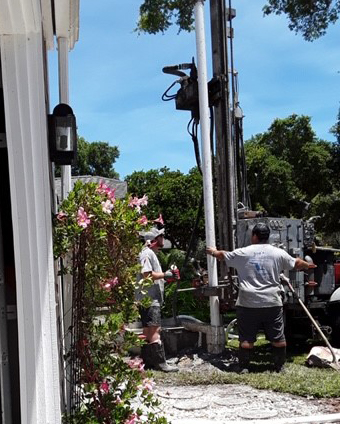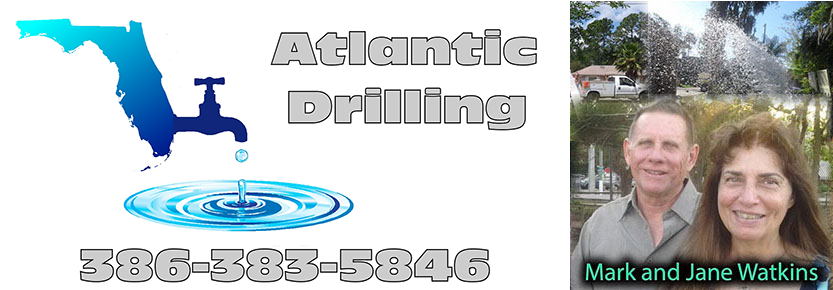



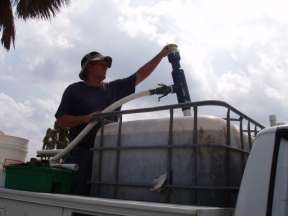
Our method for installing a Shallow Well starts by mixing a drilling fluid. Normally we mix 300 Gals. This will allow us to drill 60' or more. By using a drilling fluid we can open a bore hole and keep it open to allow for the well casing to be installed.
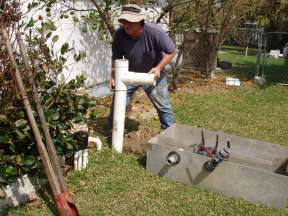
At the well location we set a stand pipe about 3' deep. This pipe will direct the drilling fluid back to a mud box. Where it will be circulated through the drill pipes as the bore hole is being drilled.
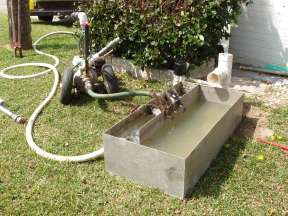
This is the system, ready to drill the well. The stand pipe is in place. The mud box is filled with drilling fluid. The drilling pump is attached. The reserve drilling fluid is available by hose as needed.
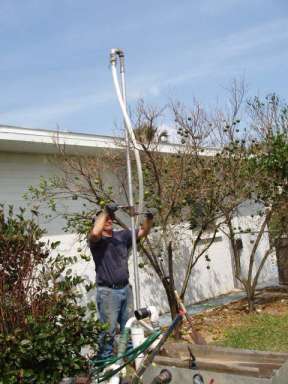
Drilling can now begin. We start with a 15' drill pipe and add sections as needed to drill the bore hole to the required depth. In Volusia County most hand wells are 20' to 40' deep. In Flagler County these wells may be 40' to 80' deep.
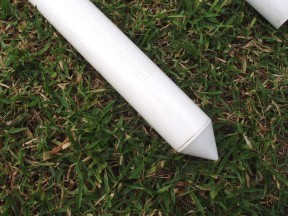
When the bore is at the depth we want. The drill pipes are removed and the Plastic PVC Well is set into the bore hole. This is a picture of the Well Point. These Well Points will be cut to a length of 3' to 10' or more. They are PVC pipe with .008 slots cut into them to allow the water to come into the well while keeping most of the sand or shell out. Above the well point the PVC well casing is attached - we use PVC SCH 40 well casing. These wells can be any of three sizes: 2", 3" or 4" Inside Diameter.
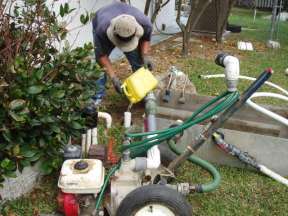
After the well is in place the well must sanitized before use.
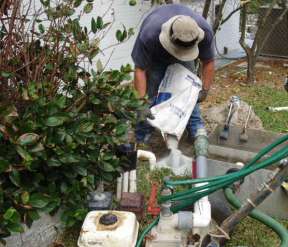
After the well is sanitized a clay product called Bentonite is placed around the casing to seal the well bore hole. This clay material will swell up to 20 times it size when wet and form a very tight seal around the new well.
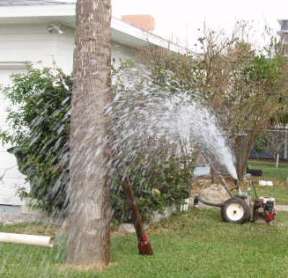
After the the well is pumped clean it is ready to be put into service.
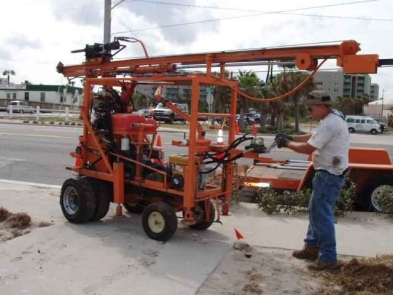
We have developed a very small Drill Machine which allows us to drill in places that other drilling machines cannot access.
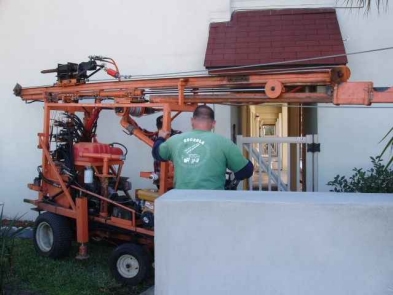
Our drill machine is trailered to the job site off loaded and is self propelled. The machine is light weight and sets up quickly.
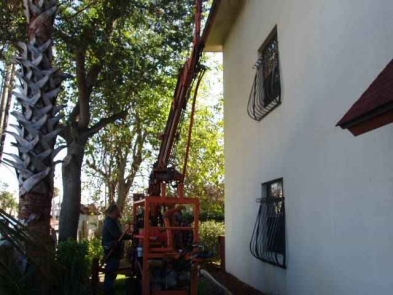
This site offered only a 40" gate to provide access to the well site. The machine being narrow (only 38" wide), had no trouble accessing the well. Here you can see the drill machine is setting up in a very confined space. In addition to being extremely maneuverable the machine will drill wells from 20' to over 140' deep in any of these three sizes: 2", 3" and 4" Inside Diameter.
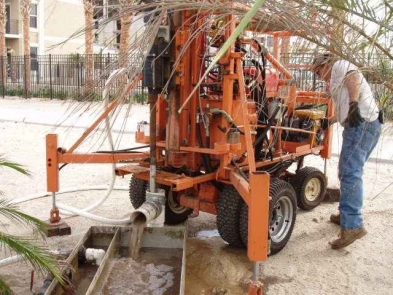
Here the drill machine begins drilling a bore hole. A Plastic PVC well will be placed into the finished bore hole.
Here is a picture of the Well Screen. Often celled a Well Point. It is made of plastic PVC pipe with .008 slots cut. The Well Screen can be 3' to more than 10' long. The Well Screen or Well Point will allow the water to enter the well while filtering out sand and other materials. Solid SCH 40 Well Casing will be attached to this Well Screen to form the well.

After the well is in place it must be sanitized before use.

After the well is sanitized a clay material called Benseal is placed around the well to form a seal around the new well. Benseal will, when wet, swell to 20 times its size forming a very tight seal.
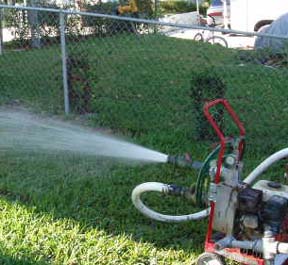
The new well is pumped clean and ready to be put into service.
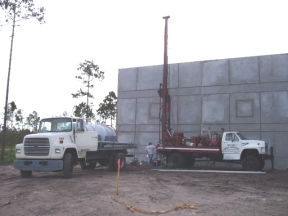
When drilling a deep well a Drilling Rig and a Support truck are required: Here the Drill Rig and its Support Truck are setup and ready to drill the well. The Drill Rig will do the work and the Support Truck carries the supplies: water, drill rods, bits and the pipe that will become the well casing.
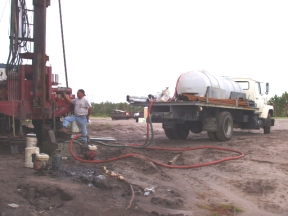
The water from the Support Truck is mixed to make a drilling fluid called a drilling mud.
This drilling mud will hold a bore hole open as the well is drilled. Without a drilling fluid the walls of the bore hole would collapse and the hole would be lost.
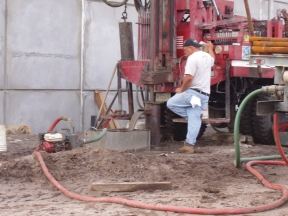
As drilling begins the drilling mud is pumped through the drill rods down the bore hole and returns to a mud box. A small pump will move the mixture back to the support truck. This process will continue as drill rods are added and the bore hole is drilled deeper.
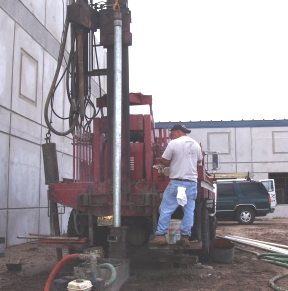
Once the bore hole has been drilled to just above a bed rock formation, the drill rods are removed and the casing is placed into the bore hole. As the casing is placed into the bore hole a clay material called Benseal is used to seal the open area around the casing and prevent overburden and surface water from entering the well.
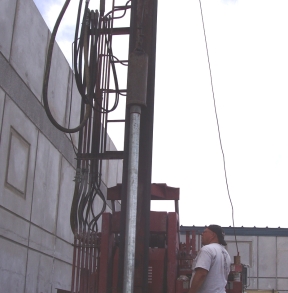
The casing is now driven into the rock formation to seal the well from the overburden thus preventing sand, shell, etc. from entering the well. Below this rock formation is the Floridan Aquifer.
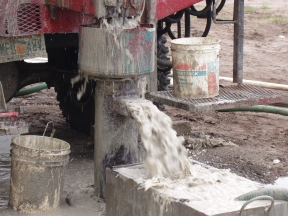
With the casing in place - drill rods are placed in the casing and drilling begins again this time into the rock. As the drilling continues clean water from the support truck is used to flush the casing. The water appears to be milky because the cuttings being flushed are lime rock which is white in color.
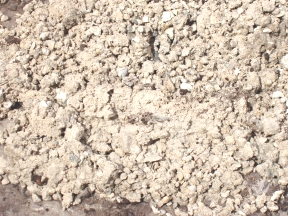
These lime rock cutting were flushed from the drill hole.
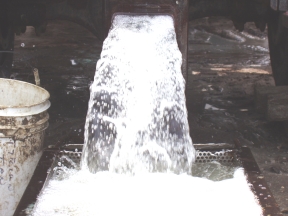
As the cuttings are removed the water becomes clear. The well will be sanitized and ready to receive the pump.
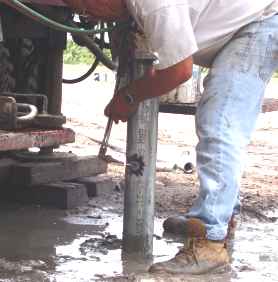
First the casing is cut to the appropriate finished height.
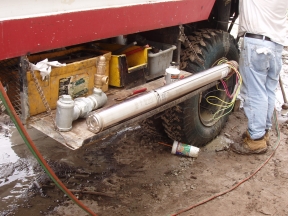
The pump is assembled and ready for installation.
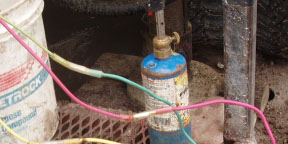
The electrical connections are made water tight by heat shrink seals.
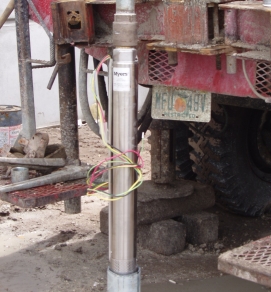
The pump is fitted into the well, drop pipe is attached to the pump and the assembly is lowered into the well. This pump was set at a depth of 64'
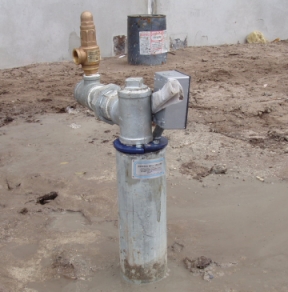
Here is the finished 4" Galvanized Deep Well with a Submersible Pump Installed. It will be used to irrigate the new landscaping.

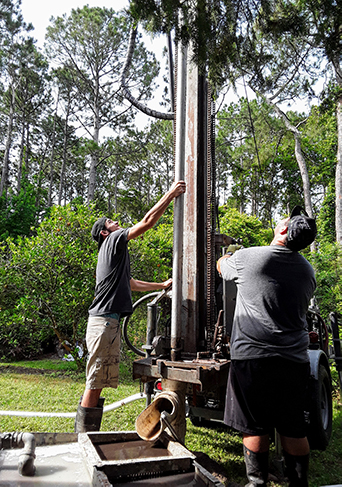
Jon, JonJon and Nick drilling a deep well
